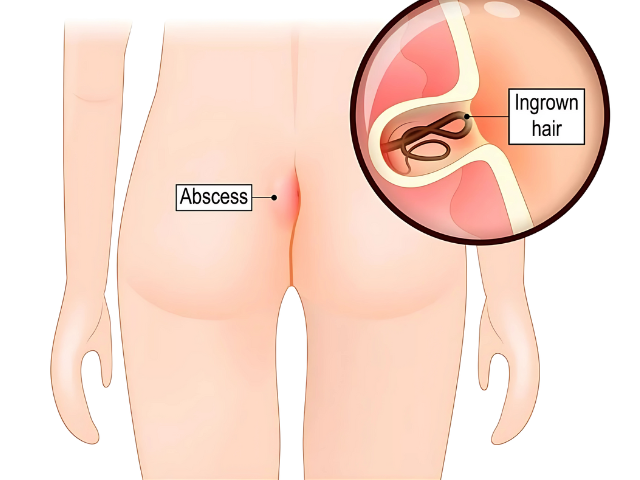Get safe and effective laser surgery for pilonidal cysts at KK Virat Hospital, Karimnagar. Our advanced procedures ensure minimal pain, quick recovery, and reduced recurrence rates. Book a consultation with our expert proctologists today!
What is the Pilonidal Sinus?
A pilonidal cyst is a small hole or tunnel at the base of the spine, near the tailbone, that can fill with hair, dirt, and debris. When infected, it becomes a painful abscess, causing discomfort, swelling, and drainage of pus. Poor hygiene, excessive sitting, and ingrown hairs contribute to its development.

Risk Factors for Pilonidal Sinus
- Male Gender: More common in men due to hormonal factors.
- Sedentary Lifestyle: Long hours of sitting increase the risk.
- Excess Body Hair: Coarse or curly hair may lead to hair accumulation in the cyst.
- Obesity: Excess weight increases pressure on the tailbone.
- Poor Hygiene: Lack of cleanliness contributes to infection.
Symptoms of Pilonidal Sinus:
- Persistent pain and swelling near the tailbone.
- Redness and tenderness around the cyst.
- Pus or blood discharge, sometimes with a foul odour.
- Formation of sinus tracts leading to chronic infection.
- Fever (in severe cases of infection).
Home Remedies for Pilonidal Sinus:
- Sitz Baths: Warm water baths help relieve pain and swelling.
- Castor Oil Application: Reduces inflammation and promotes healing.
- Maintain Hygiene: Keep the affected area clean and dry.
- Vitamin C & Zinc Supplements: Boosts immune function for faster recovery.
- Avoid Prolonged Sitting: Reduces pressure and irritation in the area.
Diagnosis of Pilonidal Sinus:
A doctor will conduct a physical examination to check for signs of infection. In severe or recurrent cases, imaging tests such as ultrasound or MRI may be required to assess the extent of the sinus tracts.
Advanced Laser Surgery for Pilonidal Sinus in Karimnagar
At KK Virat Hospital, we offer the latest laser surgery for the pilonidal sinus, ensuring minimal pain, quick recovery, and lower chances of recurrence. The procedure involves using a laser probe to remove the infected tissue and seal the tract without large incisions.
Types of Pilonidal Sinus Surgery:
- Laser Pilonidal Sinus Treatment
- Minimally invasive and highly effective.
- Faster healing with minimal pain.
- Reduces recurrence rates.
- Incision and Drainage
- Suitable for infected cysts filled with pus.
- Involves making a small cut to drain the cyst.
- Healing takes 4-6 weeks.
- Pilonidal Cystectomy (Complete Removal)
- Entire cyst and affected tissues are removed.
- Recommended for recurrent or severe cases.
- Requires longer recovery time.
Complications of Untreated Pilonidal Sinus:
- Chronic Infection: Leads to recurring abscesses.
- Multiple Sinus Tracts: Increases the complexity of treatment.
- Severe Skin Infections: Risk of cellulitis or abscess formation.
- Squamous Cell Carcinoma (Rare): Chronic pilonidal sinus may increase cancer risk.
Post-Surgery Care & Recovery Tips:
- Keep the area clean and change dressings regularly.
- Avoid prolonged sitting for at least 2-3 weeks.
- Follow prescribed antibiotics to prevent infection.
- Maintain proper hygiene to reduce recurrence chances.
- Attend follow-up appointments for wound assessment.
Why Choose KK Virat Hospital for Ingrown Toenail Removal?
- Experienced Proctologists: Our specialists have years of expertise in pilonidal sinus treatment.
- State-of-the-Art Laser Technology: Ensures painless and precise treatment.
- Minimal Hospital Stay: Most patients are discharged the same day.
- Insurance Assistance: Hassle-free approval and claims processing.
- Comprehensive Post-Surgery Care: Personalized guidance for faster recovery.
Your Health, Our Priority – Book Your Consultation Today!
Don’t let pilonidal sinus affect your daily life. Get advanced laser treatment at KK Virat Hospital, Karimnagar, for a safe and permanent cure. Contact us today to consult with our expert proctologists!
- Call Us Directly: Get in touch with our medical coordinators to schedule an appointment with an expert urologist.
- Direct Visit: You can visit our hospital directly by carrying your previous medical records if you have a medical history. However, admission will be based on the doctor’s recommendation.
Does pilonidal sinus spread?
Pilonidal sinus does not spread to other parts of the body but can develop multiple sinus tracts if left untreated. The infection may worsen, leading to abscess formation and increased pain.
Will pilonidal sinus go away?
In mild cases, keeping the area clean, avoiding prolonged sitting, and maintaining hygiene may help manage symptoms. However, once infected, pilonidal sinus usually does not go away on its own and requires medical intervention.
What can happen if the pilonidal sinus is left untreated?
If left untreated, pilonidal sinus can lead to chronic infections, multiple sinus tracts, recurring pain, abscess formation, and in rare cases, skin cancer known as squamous cell carcinoma.
How long will it take to complete laser pilonidal sinus surgery?
Laser pilonidal sinus surgery is a minimally invasive procedure that usually takes 30-45 minutes. Patients can return home the same day and resume normal activities within a few days.
Which is the best hospital to get treated for pilonidal sinus in Karimnagar?
KK Virat Hospital in Karimnagar is known for expert proctologists, advanced laser treatment, and patient-centered care, making it one of the best hospitals for pilonidal sinus surgery.
Who are the best doctors to treat pilonidal sinus in Karimnagar?
Karimnagar has several experienced colorectal surgeons and proctologists specializing in pilonidal sinus treatment at KK Virat Super Speacility Hospital. It’s best to consult a board-certified specialist for expert care.
Can pilonidal sinus cause infection?
Yes, the pilonidal sinus can become infected, leading to pus drainage, swelling, pain, and fever. If left untreated, the infection can spread deeper, requiring medical treatment or surgery.
What is the permanent solution for pilonidal sinus?
The most effective permanent solution for pilonidal sinus is laser surgery or complete excision (pilonidal cystectomy). Laser treatment ensures minimal recurrence, quick recovery, and fewer complications compared to traditional open surgery.


